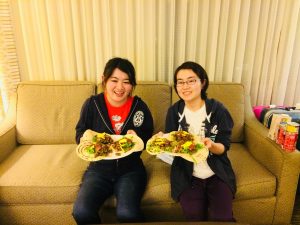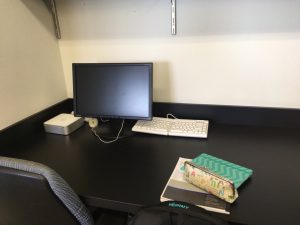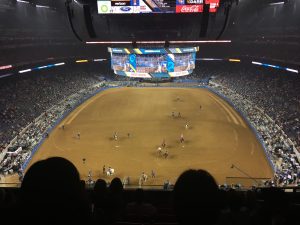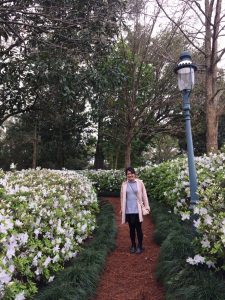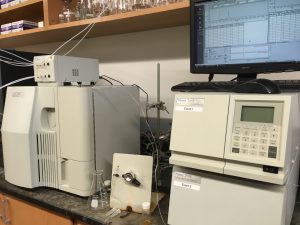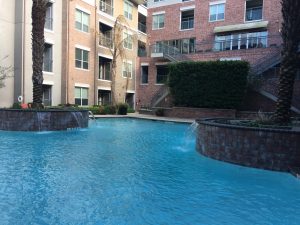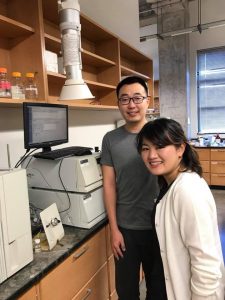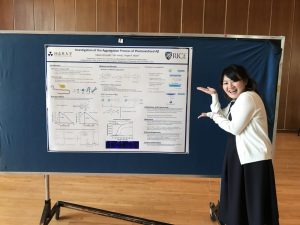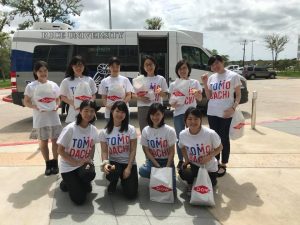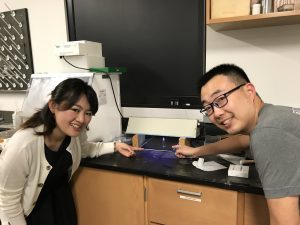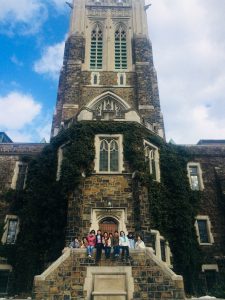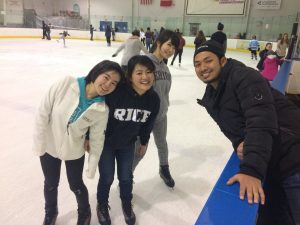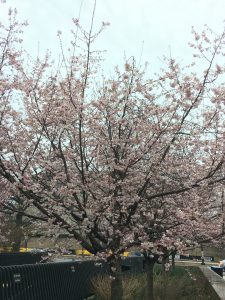[:en]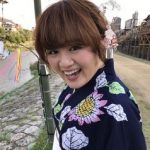 Utana Umezaki
Utana Umezaki
Hometown in Japan: Osaka
University in Japan: Doshisha University
Major & Year: Molecular Chemistry and Biochemistry, B3
Host Advisor: Prof. Angel Martí, Dept. of Chemistry
Host Lab: Martí Research Group: Inorganic and Bioinorganic Photochemistry Laboratory
Research Poster (PDF): “Investigation of the Aggregation Process of Photooxidized Aβ”
Recipient: Best Poster Presentation Award (3rd Place)
Why TOMODACHI STEM @ Rice University?
I am majoring in chemistry in Doshisha University. I want to be a researcher who can contribute to helping people all over the world in the future. To be more specific, I want to focus on research on how to heal the incurable diseases. Since I entered the university, I have been studying hard to achieve this dream. Although I am generally
quite satisfied with my university life at the moment, I sometimes feel that something is missing, and I want to see things from a wider perspective.
Right at the moment of thinking about these, I found this program. I was fascinated with it because I want to learn more about the U.S. lab works to prepare for my graduate studies. I also want to enhance my speaking and writing skills in academic English by communicating with professors and lab members. Having a good command of English is essential as a means of exchanging valuable thoughts with other researchers from various countries. I must acquire this skill because I want to work with many people from all over the world. Furthermore, Rice University is one of the best chemistry schools in the world. I expect to study with many excellent students of high competency gathered from around the world. The experience in this program at Rice University will be an extremely valuable experience for me. For these reasons, I believe that this program will be a big step toward realizing my dream and will also give a big positive impact on my life as a researcher in the future.
Goals
- Absorb knowledge through experiments, discussions, and presentations
- Learn more about the U.S. lab works to prepare for my graduate studies
- Enhance my speaking and writing skills in academic English
Meaning of TOMODACHI STEM: Post-Program
Before I participated in this program, I had three goals. To come to the point, I achieved these goals through this program.
This program gave me a chance to experience real, hands-on research in the US. Labs in the U.S. don’t have any specific work schedule, so at first time, I was confused. I got used to it after a few days and I did some experiments or made a poster by myself finally. To make my poster nice, I discussed many things about it with my mentor, host lab professor, lab members or friends. Therefore, I am satisfied with my poster and presentation. Through these studies, I acquired not only knowledge about my research but also some basic skills for research.
Furthermore, I learned how to apply to U.S. graduate schools. We had many opportunities to talk about it with participants, professors, and a lot of US graduate students. If I was in Japan, I could not know what should I do for preparation for US graduate school.
As I wrote in my prior reports, I absorbed many things besides my pre-goals in just five weeks. My new goal is to gain a PhD degree in US. I will keep making effort to achieve this dream.
Excerpts from Eria’s Weekly Reports
- Week 01: Arrival in the U.S.
- Week 02: First Week at Research Host Lab
- Week 03: Interview With a Female Researcher
- Week 04: Research in the U.S. vs. Research in Japan
- Final Research Poster Presentation
- Week 05: Science & Technology Policy Study Tour
- Final Report & Tips for Future Participants
Week 01: Arrival in the U.S.
About a week has passed since I arrived in Houston. I was surprised that traffic around Rice University is very heavy. I have studied at two other universities in US for a short period and both of them were in college towns. The traffic in those two towns were good. However, Rice University is in the 4th largest city in the U.S. and urban campuses are very different from universities in the countryside. I felt that the college town was not very dangerous even if it is night, and I wonder if it is the same around the Rice or not so much? I was also surprised at the food here. There are so many Mexican restaurants in Houston. Some of them are called Tex-Mex. Although just one week has passed, we have already enjoyed the Mexican food a lot.
This week I had some seminars at Rice. The most interesting seminar was about the life of astronaut. This was my first time to see an astronaut. Rice has a very strong connection with NASA. If I studied at other university, I could not attend such a special seminar. I am not familiar with space or astronomy but this seminar was enjoyable. Furthermore, I enjoyed some events that were held at Rice. I joined Mechanical Engineering Society’s BBQ and the Shepherd School Symphony Orchestra Concert. At the BBQ, I enjoyed free food and chatting with many undergraduate students who majoring mechanical engineering. I also enjoyed the symphony orchestra concert because I belong to an orchestra club in Japan. We play the symphony in similar ways, however, I surprised at one thing. In Japan, our concert starts by 6pm at the latest. On the other hand, this concert started at 8pm and there were so many people in the audience. I think this is because most Americans have their own car or use Ride Share Service such as Lyft or Uber. I also explored to Downtown Houston with some of the TOMODACHI participants. We ate Tex-Mex lunch and roller-skated together at Discovery Green park.
I have had a great time with TOMODACHI participants, especially my roommates. I have never had such intelligent female friends and all of us are scientific majors. I want to make more great memories with them too outside of our research labs.
Initial Reflections on U.S. vs. Japanese Culture
In Japan, we have to use polite expressions when we talk to our elders. Therefore, we often make groups with people who are all the same age or in the same grade. However, I found that all students in my lab are chatting with each other regardless of their age or grades. I felt that this reflects the core U.S. value of “Equality”. I also found that some students call their professor by their first name. That cannot ever happen in Japan. My professor told me that I could call him whatever I want. I hesitated to call him by his first name so I call his last name or professor. The US value of equality seems to make people closer to each other. I feel this is very good point of US society and culture.
In comparison, I feel that I am always seeking “Kata”. In Japan, each lab has a set or core working time. It is very easy to follow the rules. However, US labs have very flexible schedules. Therefore, I have to make my own lab schedule to achieve my task on my own; but this a very difficult thing for me. I feel that this is one aspect of my “Japaneseness”. I have to learn to become more flexible and more independent.
The similar things can be said about meetings. People in Japan do not eat or drink while listening to others. We must just sit and concentrate on the speaker. We always follow the Kata or proper form: the meeting should be quiet and you cannot do other things. If I do not follow the rules, I would be scolded. Now, I have already attended many meetings or seminars at Rice. I was very surprised because everyone can eat or drink during meeting. Although everyone was doing this, I still hesitated to do eat or drink while someone was speaking. I found that many of TOMODACH participants also hesitated. I think that this is also an example of my ‘Japaneseness’.
I want to get more used to these US values during this study abroad program. Learning about some of the differences between Japan and US will be helpful to me when I communicate with people from outside of Japan or if I return to the U.S. in the future.
Preparing for Research in the U.S.
While I was in Japan, I emailed my host professor and he recommended four papers to me. I read them before I visited my host lab. He also gave me the contact information of my mentor so I emailed him and told him my rough schedule. When reading the papers, I thought the results, discussion and conclusion were most important and I did not read the procedures very well. I should have read the papers more, especially the experimental sections, because I will now use some of sections in my research project. If I had read some of them before I had started my research, it would have been very helpful.
Before I visited my host lab, I was very nervous but both my host professor and my mentor were very nice so the ice was broken in a minute. My mentor is studying about Amyloid-β. He kindly told me how to use lab and sometimes he takes me out to eat lunch together. My host lab has a group meeting every Thursday and I attended my first meeting this week. I could not catch many things. I hope I will be able to get used to it better by the time I leave here. My professor gave me a chance to talk about my lab life and research on Friday morning. It was very helpful to tell him my concerns or problems. I memorized some people in my lab but not all people. I want to talk with people in lab more and also want to know more about what they are researching in this lab.
My research topic is about Amyloid-β (Aβ), which is related to the Alzheimer’s disease. My first week tasks were to learn how to synthesize Rhenium complex and how to purify the Aβ. My mentor showed me synthesis of the complex. He also showed me how to use the High Performance Liquid Chromatography (HPLC).
Return to Top
Week 02: First Week at Research Host Lab
This week, I have been getting used to this life little by little. I can now easily find my way around the Rice University campus and I can go many places in Houston by myself. I leave my room about 8:30 am and I walk to my lab every weekday. It takes about 30 minutes. The weather in Houston is unpredictable, so I sometimes make a wrong choice of my clothes. I usually have a lunch with someone, mostly with my TOMODACHI friends. On
Tuesday, we had a lunch event with many people who are learning Japanese at Rice. One of them told me that she had studied Japanese only for half a year. However, everyone including her, was speaking with in Japanese well, which surprised me. I started studying English when I was in elementary school but I am still not good at speaking English, so I have to practice speaking in English more.
In the evenings, we had many events this week. The most exciting one was the Houston Rodeo. I have seen some rodeo machines in Japan. All of them are in the shape of bull, so I assumed that the “Rodeo” was just watching someone riding on the bull. However, the real Rodeo has carnival foods, cute animals, and various competitions. I have never seen the people using a lariat in real life. I completely thought that it was only in western movies or dramas. I saw many people wearing cowboy hats, boots, and belts with a big buckle. I was surprised that all generations dressed as a cowboy or cowgirl. In Japan, many festivals are declining because many youth are reluctant to participate in them. I enjoyed this Texas tradition a lot and I was glad to experience it.
I also had a great weekend with my friends. I went to a Farmer’s Market on Saturday morning. I enjoyed fresh and delicious drinks and food at the market. After that I visited Rienzi Fine Arts Museum to participate in a sketching class. The museum was very small, but there were many beautiful gardens and pretty rooms. I love drawing and it was one of the best sketching places for me. I also enjoyed the Houston Museum of Natural Science and shopping at Galleria Mall. I have gone out every weekend but Houston has so many places to see. I only have one more weekend in Houston so I want to explore more places in Houston next week.
Research Project Update
My research projects focuses on aggregation of Amyloid β (Aβ) by using Rhenium complex. Aβ is protein and it causes Alzheimer Disease (AD). My task is to oxidize the Aβ by using the Rhenium complex and observe the oxidized Aβ aggregation. I have to follow four steps to achieve this goal. First, I have to synthesize the Rhenium complex. Next, purify Aβ. Third, oxidize Aβ. Finally, I observe the aggregation.
This week I did the first two things. First, I purified the Aβ. I was also trained on how to use the high performance liquid column (HPLC). I had never used the HPLC before, so I had some trouble to complete this task. I was very surprised that many chemistry experiment took a lot of time. The chemistry lab classes for undergraduate students have to finish within the specific time so I did not know that. Second, I learned how to use the PD-10 column and UV-vis analysis. To oxidize Aβ, we have to bind the Rhenium complex with Aβ. After oxidizing the Aβ, I separated the Rhenium complex and Aβ by using PD-10 column. I used the UV-vis analysis to confirm the separation.
Next week I will do some synthesis and oxidation of Aβ with my mentor. I want to observe the aggregation of oxidized Aβ by end of next week to make my poster. However, I heard that my host lab does not have some equipment to finish my research, so I am afraid of that. Furthermore, my mentor will not be at Rice next week so I am worried about my poster session. I have to learn a lot from my mentor by next weekend.
Question of the Week
I used a ridesharing service called “Lyft” several times to go out. The drivers used highways to go to destination if they needed, but I have never seen that drivers pay some money. In Japan, we have to pay a toll to get on highway. However, I have never seen that drivers pay any money. Is there any toll road in the US?
- Yes, there are certain roads in the U.S that are toll roads but most freeways are free. Americans pay for their highways largely through gas sales taxes but in heavily populated areas, like the Northeast, toll roads are more commonly used to fund infrastructure/maintenance projects on heavily trafficked roadways.
- In Houston, Beltway 8 is a toll road and there is also the Hardy Toll Road that goes from Downtown Houston to the IAH airport and northern suburbs. These toll roads are typically used by people who commute from the far suburbs into central Houston for work and there is a sensor you place on your windshield that will automatically deduct the toll from your account when you drive through. Most toll roads in the U.S. are automated like this now so, even if you are on a toll road, you do not have to stop to pay in change or cash.
- The United States of Toll Roads
- 11 Most Expensive Toll Roads in America
- Toll Roads: A Problem or a Solution?
- To Fund US Infrastructure: Charge by the Mile, Not the Gallon
- Mapping How U.S. States Pay for Roads
- Texas Scraps Some Toll Roads, While Other States Add More
- Interactive Map of Houston Toll Roads
Week 03: Interview With a Female Researchers
I interviewed a female PhD student in my host lab. When she chose her graduate school, she visited three different universities including Rice. Some of us, in Japan, also visit labs before entering the graduate school. However, most students who want to enter the graduate school goes to same university that they received their bachelor’s degree from. I feel that in the US students are thinking more about what they want to study or want to absorb from their research when they apply for graduate school. She said she decided to come to Rice because of the people. She received a warm welcome from many people. I know that everyone in my host lab is very nice so I understand why this was important to her. She also said that she liked the weather of Houston. In the US, PhD students have to stay their lab for 5 years so I understand that the climate/weather of where they will live is also important. My host lab is an inorganic and bioinorganic photochemistry laboratory. She is doing research about boron nitride and, after she obtains the PhD degree, she is thinking about working in industry. My host lab has both male and female student and the ratio is about 50:50. My university in Japan does not have such a large female population at inorganic chemistry field so this was very surprising to me. This department at Rice also has some international students from all over the world. She told me that communicating with diverse students helps make her more open minded to various cultures. Through my own study at Rice, I have discovered many new things about US. On the other hand, I can also share about my Japanese culture with Rice students and this will help expand their perspective too. I think this is one good aspects of studying abroad.
I also interviewed a female professor. She is a professor of physical chemistry. In contrast to my host lab, her lab is mostly male. She has talked with another Japanese student but, but this was with a male student. She was very busy but made time for me because she was interested in Japanese women who are majoring science. She knew that in Japan men are still the majority in all scientific field. In reality, 80% of our chemistry major are males at my university in Japan. She encouraged me to become a part of changing the situation. She also advised me that I should be more confident and stronger. I told her that I am thinking about pursuing a PhD degree at US and she told me that research is not an easy job but it is very rewarding. It was a short time to have conversation with her but she gave me a lot of courage.
This week, my mentor had a big event. He had his master’s thesis defense. He looked very busy but he still helped with my experiment and my poster a lot. I attended his practice presentation with my host lab members. All of the lab members gave him a lot of advice and asked questions to help him improve his presentation. I could see what the a thesis defense is like and this experience could be helpful for my future. I was very happy to know he passed. We had a celebration for him at Valhala, and after that we went to dinner at Mexican food restaurant. Furthermore, we had a pool party at our professor’s apartment. I cannot believe how many things we did to celebrate. In Japan, we cannot swim outside at the end of March, our apartments do not have pools, and our professors cannot invite their students to their homes. My host professor’s wife told me that they have home party at some events. This time, the party was for celebrating my mentor’s defense, so I am very lucky that I can participate. I could talk with lab members, my host professor couple there. It is still difficult for me to join the group talk but I had really good time with them.
Research Project Update
This week I investigated the Amyloidβ (Aβ) aggregation by observing the fluorescence. I used Thioflavin T (ThT) as a probe. ThT is one of the A benzothiazole dyes. When ThT binds to Aβ fibrils, the fluorescence of ThT is enhanced. Therefore, we can see whether Aβ aggregate or not. I also started making my poster. My mentor and host professor gave me some advices. Next week, I do not have my mentor with me so I will work with another student in my lab. She will give me advice on my poster. She is not doing research about Aβ but I can work with her research. It is exciting for me that I can also do some experiments about a different thing.
Question of the Week
I cannot find Greek house at Rice. Does Rice have any sororities or fraternities?
- No, unlike many other universities in the U.S., Rice does not have fraternities or sororities. This is because of the very strong undergraduate residential college system where the campus social life is centered around the different colleges/dormitories that students below to. So, for example, the different colleges will compete against each other at various events like Beer Bike and each have their own special traditions such as the Baker Shake which is an annual Shakespeare play the college puts on. For more, see this Rice News article on the Story Behind Rice Traditions and this article about how the residential colleges traditions at Rice take the place of, and play a similar role, as Greek Life at other universities in the U.S. In the past, Rice students even had to sign a matriculation pledge stating that they would not establish any fraternities or sororities on campus.
Week 04: Research in the U.S. vs. Research in Japan
In my host lab, my professor’s office is located into our office and he always keeps his office door open, so it is very easy to talk with him when we have questions. We also have a meeting every Thursday. We discuss various topics there with the professor. Furthermore, our professor held a pool party after my mentor passed his master thesis. My host lab is like a big family. I feel that the distance between a professor and students in US lab is much closer than in Japan. Our university’s labs are all separated from professor’s office. I also heard that many of Japanese professors do not join the group meeting or experiment. I will be a senior from this April and start my research for my graduate thesis. I will miss my lab at Rice a lot because of this difference. I love my host lab because of not only of the research but also people.
This experience in US will help me to choose my lab for my senior year. Before I came here, I was still not sure which lab I should apply for. While at Rice, I used some spectroscopic analysis to see the peptide aggregation here in US and now I want to study more about them. I decided to apply for a physical chemistry lab because they are doing spectroscopic analysis.
I have now also done my first presentation in my entire life. I had many troubles when I first made my poster. I asked for help to many people and all of them gave me good advice. In conclusion, I did my best on designing my poster and presenting at the poster session. I enjoyed it because I can share my research result for many people. All of my lab members came to my poster session so I was very happy. This experience will help me when I want to share my ideas or research to various people in the future.
We visited Dow Chemical on Friday. It was a very big company and the people there were very kind. I asked some questions about working at Dow. I am always worried about work with raising children. In Japan, many women have a lot of difficulty to go back their jobs after they have new babies. On the other hands, a female employee told me that Dow gave employees a 3-months paid break when they have babies and they can go back to their job afterwards. I think that it is a very big thing for women. That is one of better things about working in the US.
We also visited Pack Studios at Dow and were able to see the real factory of packing. The presenter was very good so I enjoyed the tour. I had a good time in Dow as I am interested in doing research in university, but I also interested in working as engineer or researcher in industry too.
Question of the Week
Why the American house’s lightings are so dark?
- This varies a lot by each individual’s home. Are you referring to your host professor’s lighting in their apartment? Apartments in the U.S. often have poor or very little overhead lighting. Instead, renters are supposed to buy lamps to add more light where they prefer it to be. Also, in the U.S., most residential homes don’t use fluorescent overhead lights, except for in the kitchen or maybe in basements/garages, because most Americans don’t like the harsh white light they put out. So, if you are used to stronger fluorescent overhead lights where you live in Japan that may be why U.S. homes seemed so dark to you. Remember, right now you probably have a fairly small sample size upon which to judge how bright/dark U.S. homes are. Maybe if you come back to the U.S. for graduate school you can add a few more data points on this questions. 🙂
Final Research Poster Presentation
Host Advisor: Prof. Angel Martí, Dept. of Chemistry
Host Lab: Martí Research Group: Inorganic and Bioinorganic Photochemistry Laboratory
Research Poster (PDF): “Investigation of the Aggregation Process of Photooxidized Aβ”
Recipient: Best Poster Presentation Award (3rd Place)
My research is about oxidized Amyloid-beta (Aβ) aggregation. Aβ is one of peptides. We have them in our brain and they can aggregate by themselves. However, the aggregated Aβ cause Alzheimer’s disease. Therefore, we are interested in the aggregation process of Aβ. From the previous work in my lab, they found that Rhenium complex can help oxidation of Aβ when the UV was irradiated. In this experiment, we made 3 samples to observe the aggregation. The sample 1 has only Aβ, the sample 2 has Aβ and Rhenium complex, and the sample 3 has Aβ, Rhenium complex and irradiate the UV light there. It means the sample 3 has oxidized Aβ. We investigate these 3 samples Aβ aggregation and we found that sample 1 and 2 aggregated, and sample 3 did not aggregate. In conclusion, we found that oxidized Aβ did not aggregate. In fact, we want to do more experiment about Aβ aggregation but we cannot accomplished it because I have to leave Rice for only 4 weeks. I wish I could there longer. For our future work, we want to purify the oxidized Aβ to know more about them. To achieve the goal, we have to establish the method to purify them first. Furthermore, we want to know the purify oxidized Aβ can be inhibitors for Aβ aggregation.
Week 05: Science & Technology Policy Study Tour
This week we visited Lehigh University and Washington DC. I did not do research this week, but I learned many things from this study trip. At Lehigh, the most interesting activity was the Strengths Finder assessment. We took the survey and obtained our the top 5 most dominant traits. In this activity, I learned not only about my key strengths but also about other participants’ strengths. I found that my most dominant trait is adaptability. It said that I could adapt to unpredictable things through my life. In my past, many unexpected things have happened. For example, I failed my entrance examination for senior high school and university. However, I found what I want to do at Doshisha University. Furthermore, I could participate in this program. I did not know about this program until 2 weeks before the application deadline. I think these are sort of examples of my adaptability. I did not notice as my strength before, but unconsciously, I used my adaptability. I want to maximize this strength more.
I also learned many things about graduate school in US. We talked with PhD students and some professors at Lehigh University and Howard University. I got a lot information about US graduate school through this program. I am interested in applying for US graduate school so it was very helpful. I want to come back to US for my PhD degree. I will do my best to make use of this experience.
At Lehigh, an undergraduate student took us to the campus tour. I liked the library the most. I cannot describe it in words but I have never seen such a pretty library. Lehigh is in countryside so it does not feel similar to Rice. I feel that the campus of Lehigh seems to be like Hogwarts Castle. We also went ice skating with some Lehigh students. We broke the ice on the ice rink. We had very good time there.
After we visited Lehigh, we moved to Washington DC. We have a lot of meetings scheduled but we also had some free time. I visited some Smithsonian Museums. I was surprised that all of the museums are free. I saw the Hope diamond, mummies, and so on. The most interesting museum for me is Hirshhorn Museum and Sculpture Garden. It has very unique exhibitions. They seemed strange for me. I have never seen that kind of exhibitions so it was a good experience. After returning to Japan, I was happy that I could eat my mother’s home cooking. I had never made any food before, so it was very hard for me to cook my own food during this program. It was just five weeks but I missed Japanese food a lot. I think I have to practice cooking Japanese dishes before I enter the US graduate school.
Question of the Week
Why does US have wild squirrels everywhere?
- They are native animals to North America and were here before people were here. We have lots of trees, forests, and open areas in the U.S. and many U.S. homes are built in suburban areas where there are lots of trees planted and wide open lawns where squirrels can bury their nuts.
- We also have lots of large public parks, like Hermann Park in Houston, that also make great places for squirrels to live. People think they are cute animals and some people go to parks daily to feed the squirrels (some people at Rice do this too).
- Squirrels have adapted to urban life in many ways in the U.S. even though their true home is the forest. However, they are wild animals and do sometimes bite, and can carry rabies, so it is good to only look at them from a distance and not try to pet, feed, or touch them.
- At Rice, you also have to be careful that the squirrels won’t steal your food if you are eating outside. There is a reason all the squirrels at Rice University are so fat and it’s not because they are eating lots of nuts! They even have their own Facebook page!
Final Report
This program is for only female students in STEM. In my university, we still have a very small female population in STEM fields. So, I was surprised that this was the point of this program. And also, few students in STEM want to study abroad in my university.
When I studied abroad as an exchange student, many people told me that it was an unprecedented thing that students in chemistry department went abroad to US. Therefore, I thought that I was a minority.
An email from my department office told me this program. I thought this was what I wanted to. I want to be a researcher in STEM and I am interested in US graduate school. Fortunately, I could be a member of this program and I learned a lot of things there.
In my opinion, TOMODACHI STEM @ Rice University Program is one of the best programs, which trains Japanese female researchers for the future. As I wrote above, Japan has few female scientists. On the other hand, at Rice, my host lab has an equal number of both men and women. I also interviewed a female professor of physical chemistry on the third week. She told me that I had to change the situation for female researchers in Japan. I think this is the point of this program. I am now a member of the TOMODACHI Generation and I can change this world. I made my dreams came true during this program and I got new future goals.
From these five weeks, I could expand my perspective. I am a senior now so many friends are also thinking about the future. I now have many more choices for my future than some of my other friends. I am proud of being a member of this program. I will keep studying and want to be a researcher.
Return to Top
Tips for Future Participants
During this program, I did not have problem about my baggage. I brought two suitcases so I did not have to worry about being overweight. I got many gifts at Rice, NASA, grocery stores and so on. I think you should bring two suitcases if you like shopping. The one thing that I struggled with for my daily life in US is clothing. The climate in Houston was uncertain. One day, it was like summer, however, the next day it was like winter. Someday was windy, the other days had heavy rain. Therefore, you should bring clothes for many situations. I did not imagine such situation so I did not bring many clothes for summer.
For our meals, we have kitchen at the hotel in Houston so most of us cooked by our own. It is much cheaper and sometimes healthier than eating out. I recommend you to practice some recipes while you are in Japan.
I also recommend you to read papers before you do research. Your host professor may give you some papers before you visit host lab. The papers will help your study for research or make a poster.
[:]

